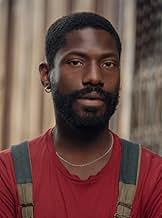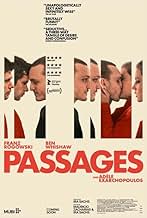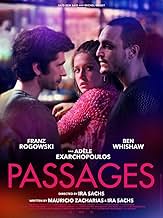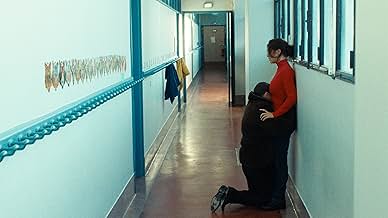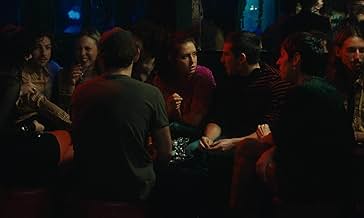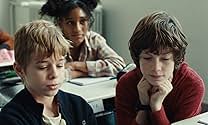IMDb-BEWERTUNG
6,6/10
13.982
IHRE BEWERTUNG
Es geht um zwei Männer, die seit fünfzehn Jahren zusammen sind und was passiert, wenn einer von ihnen eine Affäre mit einer Frau hat.Es geht um zwei Männer, die seit fünfzehn Jahren zusammen sind und was passiert, wenn einer von ihnen eine Affäre mit einer Frau hat.Es geht um zwei Männer, die seit fünfzehn Jahren zusammen sind und was passiert, wenn einer von ihnen eine Affäre mit einer Frau hat.
- Regie
- Drehbuch
- Hauptbesetzung
- Auszeichnungen
- 4 Gewinne & 25 Nominierungen insgesamt
Thibault Carterot
- Thibault
- (as Thibaut Carterot)
Theo Gabilloux
- Young Actor
- (as Théo Gabilloux)
Empfohlene Bewertungen
Who knows what routes were taken to be you, the entrances and doorways you've passed through, the aisles and the channels, the thoroughfares you've unravelled, the barriers you've broken and forced through. As you begin a fresh departure from your husband, deploying all your tools, with a brand new hand, falling for French girl Agathe, trying on restyled hat, nipping back to make sure flames are truly fanned. As the music stops you look for a new chair, continuing with conflict and despair, like a ball (a pair even) you bounce around, a kind of yo-yo is unwound, until you're snookered and then left, to go nowhere.
This is a very grounded film that challenges the viewers morality and values. The "Peter Pan" protagonist is a hedonistic director fumbling through love and life and refusing to "grow up". He thinks everyone will accept his choices because he assumes the world is on the same page: reality hits very differently. I like the exploration of queerness in this film and the torments of fluidity.
The performances are quite spectacular, especially by Adèle Exarchopoulous. Time and again she proves to be sexy, vulnerable, exquisite in every frame.
Franz Rogowski has a very Phoenix brothers quality to him and portrays the complex and haunted character very effectively, navigating from sexy, commanding, vulnerable to selfish and self-centered.
A very simple film about very complex humans. I think the cinematography, the casting, the writing, the direction all point to a masterful filmmaking that delves deeply into the contemporary human condition where we all still have a very long way to go before accepting each other for who we are.
The performances are quite spectacular, especially by Adèle Exarchopoulous. Time and again she proves to be sexy, vulnerable, exquisite in every frame.
Franz Rogowski has a very Phoenix brothers quality to him and portrays the complex and haunted character very effectively, navigating from sexy, commanding, vulnerable to selfish and self-centered.
A very simple film about very complex humans. I think the cinematography, the casting, the writing, the direction all point to a masterful filmmaking that delves deeply into the contemporary human condition where we all still have a very long way to go before accepting each other for who we are.
German film director Tomas (Franz Rogowski) and his British commercial artist husband Martin (Ben Whishaw) have been together for 15 years ...quite an achievement, I'd say, given just how immature, capricious and utterly self-obsessed Tomas routinely shows himself to be. Pretty much the only glue holding them together appears to be the fact that, whatever else may have gone stale between them, the sex is still good.
Although the script never explicitly mentions it, it would appear that theirs is an exclusive marriage: i.e. There are no intimations given to suggest that it's an open relationship, in which permission to "play away" has been agreed - so when, out of the blue, Tomas finds himself intensely attracted to a 20-something female schoolteacher called Agathe - an attraction he pursues with typically impulsive selfishness and no regard for anybody's feelings but his own - the impact on Martin (and, in due course, Agathe) is just as seismic as you'd expect.
Essentially what we have here is a portrait of a narcissist, in thrall to his own impulses, manipulative and duplicitous when it suits his purpose, and incapable of facing up to the consequences of his actions. Tomas is a study in arrested development: emotionally he's barely more than a toddler - a little boy who, on seeing a shiny new toy, must have it, and cannot understand why everybody else can't just go with his flow and let him have his way.
It's a tough challenge to play an unlikeable character and still keep your audience invested in them, but Rogowski pulls it off superbly, showing us that Tomas is as much a victim of his destructive personality traits as is everyone else who falls foul of them. As much as I despised Tomas's behaviour, I couldn't help but find myself feeling sympathy for his damaged soul. In that final night-time bike ride through Paris - having lost, by his own actions, everything of genuine value - he is truly heading nowhere.
Addendum: In the course of this movie I learned a frankly jaw-dropping, thing - that, in the 21st century, French schools have appallingly lax security: apparently any random stranger can get on the premises and barge into a classroom!
Although the script never explicitly mentions it, it would appear that theirs is an exclusive marriage: i.e. There are no intimations given to suggest that it's an open relationship, in which permission to "play away" has been agreed - so when, out of the blue, Tomas finds himself intensely attracted to a 20-something female schoolteacher called Agathe - an attraction he pursues with typically impulsive selfishness and no regard for anybody's feelings but his own - the impact on Martin (and, in due course, Agathe) is just as seismic as you'd expect.
Essentially what we have here is a portrait of a narcissist, in thrall to his own impulses, manipulative and duplicitous when it suits his purpose, and incapable of facing up to the consequences of his actions. Tomas is a study in arrested development: emotionally he's barely more than a toddler - a little boy who, on seeing a shiny new toy, must have it, and cannot understand why everybody else can't just go with his flow and let him have his way.
It's a tough challenge to play an unlikeable character and still keep your audience invested in them, but Rogowski pulls it off superbly, showing us that Tomas is as much a victim of his destructive personality traits as is everyone else who falls foul of them. As much as I despised Tomas's behaviour, I couldn't help but find myself feeling sympathy for his damaged soul. In that final night-time bike ride through Paris - having lost, by his own actions, everything of genuine value - he is truly heading nowhere.
Addendum: In the course of this movie I learned a frankly jaw-dropping, thing - that, in the 21st century, French schools have appallingly lax security: apparently any random stranger can get on the premises and barge into a classroom!
"Tomas" (Franz Rogowski) and husband "Martin" (Ben Whishaw) find their marriage severley tested when the former man starts to fall for "Agathe" (Adèle Exarchopoulos) and that passion drives "Martin" into the arms of "Amad" (Erwan Kepoa Falé). What now ensues is, frankly, a rather dull introspective of characters that didn't really leap off the screen at me. Rogowski can be a charismatic actor, but here he offers us a rather unremarkable characterisation of a horny man who wants to have his cake and eat it. Whishaw is, routinely these days on screen, just a bit weedy and presents another weakly constructed individual who seems content not to fight for the man he's supposed to love. It all just rolls along without really catching fire, it's over-scripted and though it may well have a visual authenticity to it, it's all just a bit so what? The production and pacing all contribute to the general ennui of the film and to be honest, I was just a bit disappointed with this whole thing. I saw it at the cinema this week, but I suspect even the most ardent fans of these three can wait for a television screening.
Not all films need to be message driven, but I think any director or writer makes a film because they have something to say. In that sense, I'm not sure what 'Passages' wanted to say.
There was an ample potential to make an interesting social cut in the age of more fluid sexuality. "don't pigeon-hall yourself", "follow your heart"", you could be anything and love anybody"... and so on all sound great, but how it actually works in reality, and how it could clash with the traditional idea of a committed relationship, gender roles, and responsibility of a parenthood. There still are remnants of such questions and reflections in 'Passages'. Problem is Tomas is too big a rotten character and consumes all the drama. He's self absorbed (resulting in being selfish even without a malicious intend), cowardly, dishonest with himself and others, emotionally needy yet wants to dominate the situation, and above all manipulative (oh, and his fashion sense is pretty atrocious, but that's just based on my taste). It makes in contrast his male and female partners innocent victims, leaving very little room for a balanced reflection on sexuality/relationship/gender role issues.
Maybe a social commentary was not the director's intention. Maybe a character study was the goal? But surprisingly we don't really get to see the depth of Tomas and even less of Martin and Agathe. Why is Tomas the way he is? What was Tomas's relationship with Martin like before the storm? What did Tomas really see in Agathe and the future with her?
All the sex scenes were fun to watch, but if a character study was the goal maybe the film could have used those minutes more towards... well, to show the character. 'A rotten character ruins the lives of others' is too obvious a conclusion for a character study or even just any old relationship drama.
Passages is an OK drama. Technically sufficient and actings are decent (though I think it failed to utilize all the potential of such interesting actors as Whishaw and Rogowski). But it left me wondering what it really was all for... or is it just me out of my depth?
There was an ample potential to make an interesting social cut in the age of more fluid sexuality. "don't pigeon-hall yourself", "follow your heart"", you could be anything and love anybody"... and so on all sound great, but how it actually works in reality, and how it could clash with the traditional idea of a committed relationship, gender roles, and responsibility of a parenthood. There still are remnants of such questions and reflections in 'Passages'. Problem is Tomas is too big a rotten character and consumes all the drama. He's self absorbed (resulting in being selfish even without a malicious intend), cowardly, dishonest with himself and others, emotionally needy yet wants to dominate the situation, and above all manipulative (oh, and his fashion sense is pretty atrocious, but that's just based on my taste). It makes in contrast his male and female partners innocent victims, leaving very little room for a balanced reflection on sexuality/relationship/gender role issues.
Maybe a social commentary was not the director's intention. Maybe a character study was the goal? But surprisingly we don't really get to see the depth of Tomas and even less of Martin and Agathe. Why is Tomas the way he is? What was Tomas's relationship with Martin like before the storm? What did Tomas really see in Agathe and the future with her?
All the sex scenes were fun to watch, but if a character study was the goal maybe the film could have used those minutes more towards... well, to show the character. 'A rotten character ruins the lives of others' is too obvious a conclusion for a character study or even just any old relationship drama.
Passages is an OK drama. Technically sufficient and actings are decent (though I think it failed to utilize all the potential of such interesting actors as Whishaw and Rogowski). But it left me wondering what it really was all for... or is it just me out of my depth?
Wusstest du schon
- WissenswertesThe film was rejected by both the Cannes Film Festival and the Venice Film Festival. It ended up having its world premiere at the Sundance Film Festival 2023.
- Zitate
Tomas Freiburg: Martin!
Martin: Uh-huh?
Tomas Freiburg: Agathe is pregnant.
Martin: Did you sleep with me to tell me that?
- SoundtracksWon't You Buy My Sweet Blooming Lavender
Written by Janet Penfold
Performed by Janet Penfold (uncredited)
Also performed by Franz Rogowski (uncredited)
Top-Auswahl
Melde dich zum Bewerten an und greife auf die Watchlist für personalisierte Empfehlungen zu.
- How long is Passages?Powered by Alexa
Details
Box Office
- Bruttoertrag in den USA und Kanada
- 551.611 $
- Eröffnungswochenende in den USA und in Kanada
- 63.277 $
- 6. Aug. 2023
- Weltweiter Bruttoertrag
- 1.116.810 $
- Laufzeit1 Stunde 31 Minuten
- Farbe
- Seitenverhältnis
- 1.66 : 1
Zu dieser Seite beitragen
Bearbeitung vorschlagen oder fehlenden Inhalt hinzufügen




